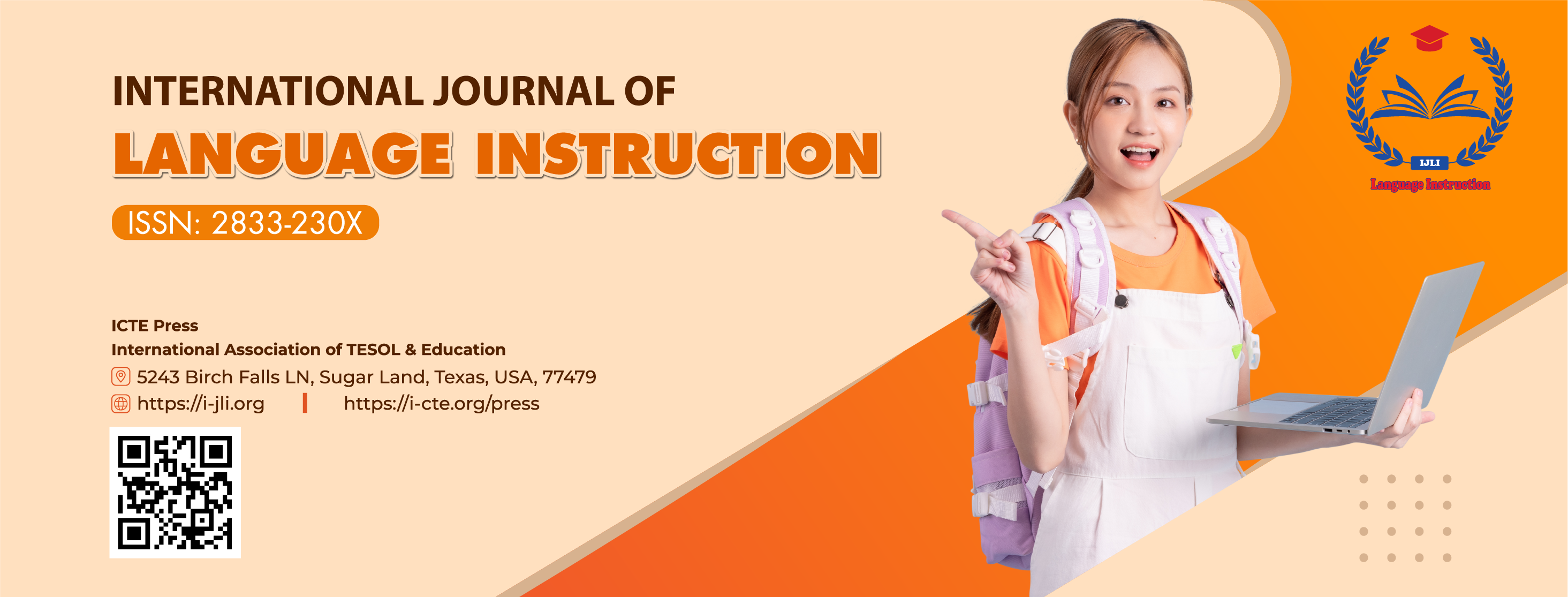Listening Comprehension in English Language Learning: Challenges, Strategies, and Students’ Attitudes at a Private University
DOI:
https://doi.org/10.54855/ijli.25432Keywords:
listening comprehension, language learning strategies, learner attitudes, perceptionsAbstract
This study examined the challenges that English majors faced when attempting to enhance their listening comprehension, a crucial aspect of learning a foreign language. It also examined the strategies they used to solve these problems and their attitude toward learning to listen. The researchers employed both a questionnaire administered to 110 students and semi-structured interviews conducted with six students and six lecturers at a private university in Vietnam. This mixed-method approach was useful for gathering both general trends and detailed insights. The findings revealed common difficulties, including rapid speech, limited vocabulary, challenging accents, and difficulty understanding spoken language. Students employed various strategies to address these problems, including cognitive strategies (identifying keywords and inferring meaning), metacognitive strategies (planning and verifying understanding), and affective strategies (maintaining motivation), which aided them during their listening practice. The study also explored students’ attitudes, which are both positive and negative toward listening comprehension. In addition, lecturers’ perceptions of how students performed were also examined. Overall, the study aims to help lecturers and universities design more effective listening activities so that students can build confidence and succeed in learning English.
References
Adalta, F. A. (2022). Students’ attitude and anxiety in listening class: A descriptive quantitative study of second semester English education students of UIN Fatmawati Sukarno Bengkulu [Bachelor’s thesis, UIN Fatmawati Sukarno Bengkulu]. UIN Repository. https://doi.org/10.58518/jelp.v1i1.970
Al-Ghazo, A. (2023). The impact of notetaking strategy on EFL learners’ listening comprehension. Theory and Practice in Language Studies, 13(5), 1136-1147. https://doi.org/10.17507/tpls.1305.06
Ali, Y. (2020). Difficulties faced by tertiary-level EFL learners in listening. British Journal of English Linguistics, 8(2), 90-112. https://www.researchgate.net/publication/349216931
Alzamil, J. (2021). Listening skills: Important but difficult to learn. Arab World English Journal, 12(3), 366–374. https://doi.org/10.2139/ssrn.3952957
Anggarista, S., & Wahyudin, A. Y. (2022). A Correlational Study of Language Learning Strategies and English Proficiency. Journal of Arts and Education, 2(1), 26-35. http://jurnal.teknokrat.ac.id/index.php/JAE/article/view/68/44
Bingol, M. (2017). Importance of Listening Comprehension: A Literature Review. International Journal of Social Sciences and Educational Studies, 4(2), 109-114. https://doi.org/10.23918/ijsses.v4i2sip109
Buck, G. (2010). Assessing listening. Cambridge University Press.
Bui, T. K. L. (2024). Findings of Using Schema-Building Activities to Improve EFL Learners’ Listening Comprehension. International Journal of Language Instruction, 3(4), 1-19. https://doi.org/10.54855/ijli.24341
Chriswiyati, S., & Subekti, A.S. (2022). Indonesian L2 learners’ listening anxiety and socio-affective listening strategy: A survey study. Englisia: Journal of Language, Education, and Humanities, 9(2), 32–45. https://doi.org/10.22373/ej.v9i2.10708
Diora, L., & Rosa, R. N. (2020). An analysis of students’ difficulties in listening comprehension. Journal of English Language Teaching, 9(1), 85–98. https://doi.org/10.24036/jelt.v9i1.107957
Dong, M. H. (2022). An investigation into English-majored students’ difficulties in doing their listening comprehension tasks. European Journal of Foreign Language Teaching, 6(1), 90–101. https://doi.org/10.46827/ejfl.v6i1.4202
Fadili, M., Kurniasari, R., & Amalia, H. (2024). An analysis of factors of students’ difficultie in listening comprehension. Jadila, 4(3), 161–175. https://doi.org/10.52760/jadila.v4i3.782
Fathi, J., Derakhshan, A., & Torabi, S. (2020). The effect of listening strategy instruction on second language listening anxiety and self-efficacy of Iranian EFL learners. SAGE Open, 10(2), 1-13. https://doi.org/10.1177/2158244020933878
Field, J. (2009). Listening in the language classroom. Cambridge University Press.
Ghafar, Z. N., Sawalmeh, M. H., & Mohamedamin, A. A. (2023). Students’ Strategies for Improving Their Listening Comprehension. Journal of Humanities and Social Sciences Studies, 5(1), 65–71. https://doi.org/10.32996/jhsss.2023.5.1.9
Getie, A. S. (2020). Factors affecting the attitudes of students towards learning English. Cogent Education, 7(1), 1-37. https://doi.org/10.1080/2331186X.2020.1738184
Gilakjani, A. P., & Sabouri, N. B. (2016). Learners’ listening comprehension difficulties in English language learning: A literature review. English Language Teaching, 9(6), 123-133. https://doi.org/10.5539/elt.v9n6p123
Goh, C. C. M. (2000). A cognitive perspective on language learners’ listening comprehension problems. System, 28(1), 55-75. https://doi.org/10.1016/S0346-251X(99)00060-3
Goh, C. C. M., & Vandergrift, L. (2021). Teaching and learning second language listening: Metacognition in action. Routledge.
Graham, S. (2006). Listening comprehension: The learners’ perspective. System, 34(2), 165-182. https://doi.org/10.1016/j.system.2005.11.001
Hermida, R. (2021). Listening comprehension difficulties faced by EFL students. ACCENTIA, 1(2), 1–10. https://ejournal.unmuha.ac.id/index.php/accentia/article/view/1155
Huong, T.T.A., Ha, N.D.N., Tuyen, T., & Trang, L.T.T. (2021) English-majored students’ listening difficulties and use of strategies at Mien Dong University of Technology, Vietnam. European Journal of Education Studies, 8(10), 99-120. http://dx.doi.org/10.46827/ejes.v8i10.3932
Jyoti, R. (2020). Exploring English Language Students’ Difficulties in Listening Comprehension. Journal La Edusci, 1(3), 1–10. https://doi.org/10.37899/journallaedusci.v1i3.125
Le, X. M., & Le, T. T. (2022). Factors affecting students’ attitudes towards learning English as a foreign language in a tertiary institution of Vietnam. International Journal of TESOL & Education, 2(2), 168–185. https://doi.org/10.54855/ijte.22229
Li, K., Qin, X., Ji, S., & Zou, L. (2023). The effects of general listening anxiety and listening test anxiety on self-perceived listening performance among Chinese English learners. Psychology Research and Behavior Management, 16, 3541–3560. https://doi.org/10.2147/PRBM.S422030
Mirza, H., Pathan, H., Memon, S., & Memon, S. (2023). An investigation of listening comprehension difficulties encountered by L2 learners in classroom, Sindh Pakistan. Elementary Education Online, 20(5), 2353–2366. https://ilkogretimonline.org/index.php/pub/article/view/5532
Namaziandost, E., Neisi, L., Mahdavirad, F., & Nasri, M. (2019). The relationship between listening comprehension problems and strategy usage among advance EFL learners. Cogent Psychology, 6(1), 1-19. https://doi.org/10.1080/23311908.2019.1691338
Nguyen, N. P. Q., Le, N. H., Hoang, N. T. Q., Le, T. Q. T., Lang, L. T. M., & Le, T. H. (2024). Applying the note-taking method to enhance listening comprehension skills for second- year English language teacher education students at Vinh University. Vinh University Journal of Science, 53(2C), 120-137. https://doi.org/10.56824/vujs.2024c006c
Nishanthi, R. (2018). The importance of learning English in today world. International Journal of Trend in Scientific Research and Development, 3(1), 871–874. https://doi.org/10.31142/ijtsrd19061
Nushi, M., & Orouji, F. (2020). Investigating EFL teachers’ views on listening difficulties among their learners: The case of Iranian context. SAGE Open, 10(2), 1-16. https://doi.org/10.1177/2158244020917393
Paramole, O. C., Adeoye, M. A., Arowosaye, S. A., & Ibikunle, Y. A. (2024). The impact of active listening on student engagement and learning outcomes in educational settings. International Journal of Universal Education, 2(2), 77–89. https://doi.org/10.33084/ijue.v2i2.8898
Pei, T., Suwanthep, J., & Lu, H. (2023). The effect of self-directed online metacognitive listening practice on Chinese EFL learners’ listening ability, metacognition, and self efficacy. Frontiers in Psychology, 14, 1285059. https://doi.org/10.3389/fpsyg.2023.1285059
Phan, L., & Nguyen, D. (2023). An Investigation into Difficulties in Listening Comprehension Encountered by English-Majored Freshmen at Dong Nai Technology University and Recommendations. European Journal of Education and Pedagogy, 4(2), 120–127. https://doi.org/10.24018/ejedu.2023.4.2.611
Prayogi, A. R., Elfrida, & Hardiah, M. (2019). An investigation of listening comprehension strategies used by sixth semester students of English Education Study Program at University of Bengkulu. Journal of English Education and Teaching, 2(4), 76–83. https://doi.org/10.33369/jeet.2.4.76-83
Purba, C. N. (2020). Improving students’ listening comprehension through new vocabulary learning. Budapest International Research and Critics Institute (BIRCI-Journal): Humanities and Social Sciences, 3(2), 1270–1279. https://doi.org/10.33258/birci.v3i2.971
Rahimi, M., & Katal, M. (2012). The role of metacognitive listening strategies awreness andpodcast-use readiness in using podcasting for learning English as a foreign language.. Computers in Human Behavior, 28(4), 1153-1161. https://doi.org/10.1016/j.chb.2012.01.025
Rost, M. (2015). Teaching and Researching Listening: Third Edition (1st ed.). Routledge. https://doi.org/10.4324/9781315732862
Rungsinanont, S. (2024). Factors and problems affecting English listening comprehension skills of Eic undergraduate students at RMUTL Tak, Thailand. Revista de Gestão Social e Ambiental, 18(5), 1–31. https://doi.org/10.24857/rgsa.v18n5-043
Saputri, A., Ahada, I., Setiawan, I., & Sucahyo, D. (2025). Listening Comprehension Challenges: Analyzing EFL Students in the English Teacher Education Program at Universitas Mulawarman. Borneo Educational Journal (Borju), 7(1), 147–157. https://doi.org/10.24903/bej.v7i1.1995
Saraswaty, D. R. (2018). Learners’ difficulties & strategies in listening comprehension. English Community Journal, 2(1), 139–152. https://doi.org/10.32502/ecj.v2i1.1003
Sharif, S., Ahmad, N., Yean, C. P., Shaharuddin, G. S., & Er, C. T. (2024). Exploring listening strategies in language learning. International Journal of Academic Research in Business and Social Sciences, 14(7), 65–81. https://doi.org/10.6007/IJARBSS/v14-i7/21707
Tran, T. A. H., Nguyen, D. N. H, Tran, T., & Le, T. T. T. (2021). English-majored students’ listening difficulties and use of strategies at Mien Dong university of technology, Vietnam. European Journal of Education Studies, 8(10), 99-120. http://dx.doi.org/10.46827/ejes.v8i10.3932
Vandergrift, L. (1999). Facilitating second language listening comprehension: Acquiring successful strategies. ELT Journal, 53(3), 168–176. https://doi.org/10.1093/elt/53.3.168
Vandergrift, L. (2005). Relationships among motivation orientations, metacognitive awareness and proficiency in L2 listening. Applied Linguistics, 26(1), 70-89. https://doi.org/10.1093/applin/amh039
Vandergrift, L. (2007). Recent developments in second and foreign language listening comprehension research. Language Teaching, 40(3), 191–210. https://doi.org/10.1017/S0261444807004338
Vani, M. K. S., & Veeranjaneyulu Naik, D. N. (2023). Significance of Listening Skills in Enhancing the Communication Skills. Smart Moves Journal Ijellh, 11(7), 9–16. https://doi.org/10.24113/ijellh.v11i7.11442
Downloads
Published
Issue
Section
License
Copyright (c) 2025 Pham Thuy Dan Khanh, Le Thi Ngoc Diep

This work is licensed under a Creative Commons Attribution 4.0 International License.
The copyright of all articles published in the International Journal of Language Instruction (ijli) remains with the Authors, i.e. Authors retain full ownership of their article. Permitted third-party reuse of the open access articles is defined by the applicable Creative Commons (CC) end-user license which is accepted by the Authors upon submission of their paper. All articles in the ijli are published under the CC BY-NC 4.0 license, meaning that end users can freely share an article (i.e. copy and redistribute the material in any medium or format) and adapt it (i.e. remix, transform and build upon the material) on the condition that proper attribution is given (i.e. appropriate credit, a link to the applicable license and an indication if any changes were made; all in such a way that does not suggest that the licensor endorses the user or the use) and the material is only used for non-commercial purposes.
Authors are able to enter into separate, additional contractual arrangements for the non-exclusive distribution of the journal's published version of the work (e.g., post it to an institutional repository, in a journal or publish it in a book), with an acknowledgment of its initial publication in this journal.











